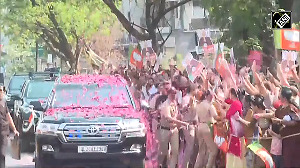Of the 6.6 million visas the US government issued last year globally, about 630,000 went to Indians in their home country and abroad. 'Mission India' benefited 560,000 people.
 The US Consulate in Chennai, which covers South Indian states, issued 95,000 visas in 1999.
The US Consulate in Chennai, which covers South Indian states, issued 95,000 visas in 1999.
Last year, it issued around 230,000 visas, 2.5 times more. "People think that we had issued only 55,000 visas last year, but this is not correct," Chennai-based US consulate officer Ravi Srivastava said in Mysore.
Of the 230,000 visas issued, 50 per cent were for travel purposes, 36 per cent were work visas and for their dependents and 9 per cent were for students. The rest was for VIPs and others.
A majority of Indians were travelling to the US on B-1 and B-2 visas, he said, while New Delhi's political-military and nuclear affairs second secretary David Holmes added that 90,000 Indian students were studying in the US, the largest number. "We welcome more".
"We have the largest non-resident Indian community living in the US. There are as many as 2.57 million Indians there, about four times that of Mysore's population," Ravi said adding, "The relationship between the US and India is not what it used to be."
The primary thrust is on a more durable and long-lasting relationship, he asserted, while addressing members of the Mysore Chamber of Commerce and Industry.
Ravi, who was speaking on 'Facilitating Travel to the US', said, "India-US relationship has grown strong. There has been a positive change in the past 10 years. We are looking towards the future."
He denied discrimination based on religious or visas being rejected in large numbers. Obtaining visas depended upon factors like convincing the visa officer on the reason for visiting the US and not for settling down there. "You have to be credible. We look into that only," Ravi said.
David, who was speaking on the 'Indo-US Relations: A New Perspective', said President Obama eagerly looked forward to the visit of Prime Minister Manmohan Singh to the US on November 24.
He referred to Obama's repeated statements over US interests in building up ties with India and secretary of state Hillary Clinton's visit to India within six months of being in office.
He also referred to external affairs minister S M Krishna's strategic dialogue across five key pillars, including nuclear, science and technology, climate change and education, and trade and agriculture, which, he said characterised the recent ties between the two countries "We have worked on certain issues and have other important issues that need to be taken up further," he said.










 © 2025
© 2025